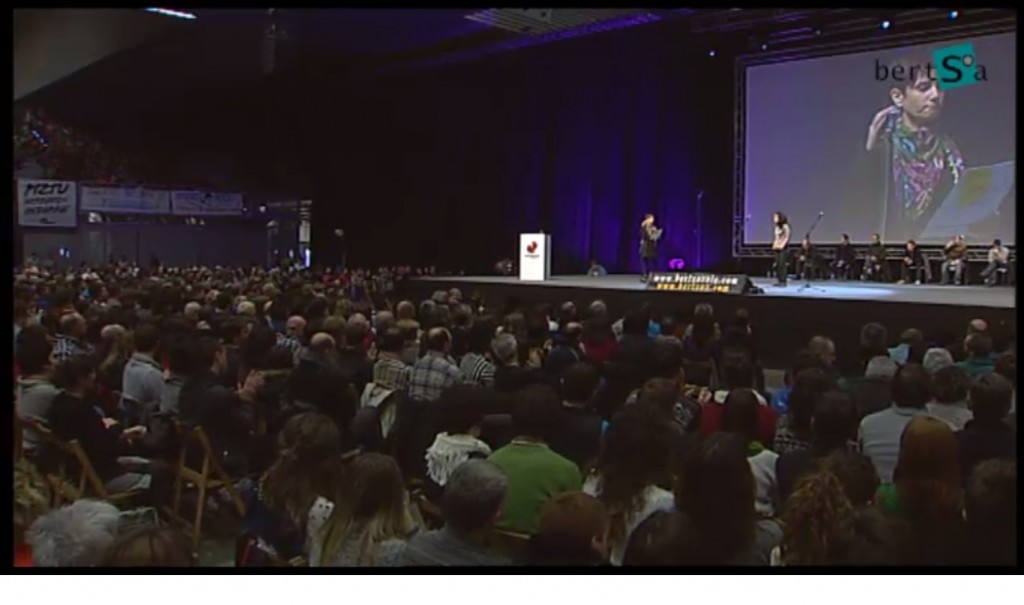“Luna de aquel Bilbao… allí vivió el amor… cuantos recuerdos… llevo aquí adentro… sé que les vuelvo a contar siempre el mismo cuento, pero no habrá un lugar donde una pueda estar tocando el más allá, como el Bilbao”
Bertolt Brecht y Kurt Weill (Canción de Bilbao, 1929)
En estos tiempos donde siempre hay alguien que irremediablemente se empeña en sembrar sombras que se cuelan en nuestros sueños de ciudad improvisada; igualmente, digo, hay quienes imaginaron e imaginan otras geografías posibles iluminadas por destellos deletreados que dejan a las sombras vencidas, mientras perfilan coordenadas de compromiso y esperanza. Ayer fueron Juan, Blas, Gabriel o Ángela y muchos otros… hoy… bien podrían ser Mikel, Santi o Iván y otros muchos.
Mikel Varas (Bilbao, 1980)
“Cada instante, algo se quiebra y, situado entre la luz y el vacío, crea la sombra y hace que la luz tenga sentido… Me sirvo de la luz y de las sombras para escribir palabras en el aire, para que los pájaros puedan leerlas” (Artista).
Un Sol cabizbajo
borra mi silencio.
Un tumulto.
Un problema.
Una risa.
Un sollozo
pero solo en el ojo derecho.
El otro está cansado.
Se acostumbró a vivir…
A vivir llorando.
(Poema “Abando 5 a.m.”, Mikel Varas ©).

(Escultura “Agur”, de la Serie “Madera de Ciudad”, Mikel Varas ©).
Santi Pérez Isasi (Bilbao, 1978)
“Ahora me voy… Pero me quedo… Un bilbaíno nunca se aleja mucho de Bilbao, por muy lejos que vaya; un bilbaíno nunca es más bilbaíno que cuando está lejos de Bilbao. Bilbao seguirá siendo la ciudad de mi infancia, de mi familia y de mis amigos” (Dos años ya).
Una vez que estaba especialmente aburrido, o especialmente inspirado, no lo sé, decidí matarme. No suicidarme, que es una cosa tremendamente vulgar y que ya se ha hecho miles de veces, sino matarme como si matase a otra persona; matar a Santi Pérez Isasi, no a mí; no yo a mí mismo sino… bueno, eso.
Así que empecé a hacer las cosas que creo que haría si quisiera matar a otra persona. Primero, para disimular empecé a tratarme especialmente bien a mí mismo. Me llevaba a cenar a sitios caros; me acompañaba de librerías (aunque todo el mundo sabe que a mí en realidad también me gusta ir de librerías); me daba masajes en la espalda, en los pies, en las piernas… Sobre las cosas que me hacía a mí mismo en otras áreas prefiero no hablar.
Una vez conseguida mi confianza, empecé a llevar la cuenta de mis hábitos. Lamentablemente, pronto descubrí que Santi Pérez Isasi es una persona de pocos hábitos: es imposible saber a qué hora va a salir de casa, ir a trabajar o bajar a tomarse un café. Maldita vida sin horarios…
De manera que mi mejor opción de cogerme desprevenido era esperarme a la puerta de casa un día que hubiera salido… [cont.]
(Fragmento de “Matar a Santi Pérez Isasi”, Santi Pérez Isasi ©).
Iván Repila (Bilbao, 1978)
“Si quedara un solo hombre o una sola mujer sobre la Tierra, seguiría soñando. No tengo ninguna duda. Si quedaran dos, el primero le contaría el sueño al segundo” (Entrevista).
—¿Y qué crees que encontrarás al final?
—No me importa. Quizá haya un castigo, o una recompensa. Quizá haya dolor, nada más que dolor, un dolor tan blanco que me deje ciego. Me da igual. La vida es maravillosa, pero vivir es insoportable. Yo quiero acotar la existencia. Pronunciar durante un siglo una larga y única palabra, y que ella fuera mi verdadero testamento.
—¿Un testamento para quién?
—Para quienes puedan entenderlo.
—¿Crees que seré recordado?, pregunta el Pequeño.
—Quizá por tus contemporáneos, por tu generación, responde el Pequeño.
—Eso no es suficiente. No sé si pertenezco a alguna generación: ninguno de mis seres queridos tiene mi edad. Seré recordado por todos, hasta que no quede un solo hombre sobre la tierra.
—¿Y por qué habrías de serlo? [cont.]
(Fragmento de “El niño que robó el Caballo de Atila”, Iván Repila ©).
Mikel, Santi e Iván nos invitan a explorar una nueva cartografía de vocales y consonantes. Florecen nuevas letras en la ciudad de titanio con una clara voluntad de futuro y de acción, con libertad de estilo, imaginativa y comprometida.
Llego la primavera y pronto el verano, y los casi tres años transcurridos desde que Sergio nos dejó bien podrían haber sido tan solo tres interminables segundos que se funden en abrazos en el despertar de la noche. “Hacia la luna he de volar sobre ella, serpiente azul con mil ojos que adora el fondo que en su noche sueña en calma. Hasta entonces la observo en una estrella, vigilo por si vuela a cada hora y así no pierda Bilbao lo que es su alma”. Nuestro Bilbao.




